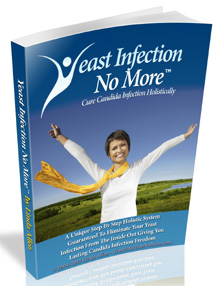Vaginal and Male Yeast Infections-Why Antifungal Herbs Might Make Things Worse
Free Video Reveals 1 Weird Tip To Quickly Cure Your Candida Overgrowth & Enjoy Permanent Freedom From Yeast Infections In As Little As 12 Hours - Guaranteed!
>> Yeast Infection Guaranteed Treatment Click Here <<
If you now suffer from a vaginal yeast infection or a male yeast infection, you've probably searched the Web for a mild, natural cure. And you've probably landed on web pages that suggest a variety of antifungal herbs, such as oregano oil, grapefruit seed extract, black walnut, etc.
If so, you found web pages written by people who believe in a syndrome that the medical community does not acknowledge or accept as scientifically valid ? called "systemic yeast infections," "systemic candidiasis," or "Candida overgrowth."
The folks who believe in this syndrome have a long list of symptoms that are supposed to be caused by having too much yeast in your gut. Genital yeast infections are included on the list, but there are over 30 other vague symptoms, too ? including such things as fatigue, insomnia, digestive problems, and infertility.
In fact, if you feel less than perfect, these folks will blame it on Candida.
It seems natural, then, to assume that the remedies recommended for this general, systemic type of yeast infection will also work for your vaginal yeast infection or male yeast infections. However, there is no proof that this is true, and there are good reasons to believe that the antifungal herbs can actually make things worse for you.
You could even find yourself with chronic yeast infections, instead of the one irritating rash you've got now.
Why? Because the most common cause of yeast infections is the use of antibiotics. And the herbs listed above are mild antibiotics. They may kill off some of the yeast in your intestinal tract (which is not the yeast that's actually making you itch), but at the same time your beneficial bacteria population will also be damaged.
For this reason, the systemic yeast infection crowd always suggests that you start eating yoghurt or taking probiotic supplements ? exactly the same recommendation you would get from your doctor to lower your risk of getting a yeast infection when you need to take antibiotics.
In other words, if the herbs have the killing power that's claimed for them, using the herbs will damage the bacterial population that is your body's first line of defense against yeast infections.
It would be in your best interest to skip the herbs altogether, and eat the yogurt. Some people with genital yeast infections also put the yogurt directly on the infected area, to get the beneficial bacteria right where they're needed. There have been no studies that prove that this works, but thousands of people swear by it, and it certainly can't hurt.
The "systemic yeast infection" web pages also recommend fairly complicated Candida diets, and there is one aspect of these diets that you should follow ? if you're suffering from a vaginal or male yeast infection you should stop eating sugar and white flour, at least until the symptoms and rash are gone.
Sugar has mild antibiotic properties and yeast loves it. It won't hurt you to give it up for a week or so.
If you want a natural, soothing yeast infection remedy, apply a mild vinegar solution to the affected area. One safe way to do this is to put a cup or more of apple cider vinegar in hot bath water, and then get in for a nice relaxing soak. Or you can sponge your genital area with a vinegar solution, if a relaxing bath doesn't appeal to you for some reason.
Ladies, do not use a vinegar douche if you have the symptoms of a yeast infection ? if you've guessed wrong and actually have a bacterial infection instead, you could cause permanent damage to your reproductive organs.
(Yeast and other fungi really don't like vinegar, so if you ever have athletes' foot or nail fungus, remember this remedy and give your tired feet a good soak in a tub of warm vinegar solution. It may smell funny, but the fungus will almost always disappear without resorting to more expensive and invasive medications from the drug store.)
So stay away from antifungal/antibiotic herbs if you have a vaginal or male yeast infection, stop eating sugar and white flour at least until the symptoms are gone, and try soaking your rash in a nice warm vinegar bath.
If these mild and safe home remedies don't work in a few days, it's time to get yourself to a doctor. No home remedy is guaranteed to cure every yeast infection.
And it's important to remember that a self-diagnosis is not always right ? your home remedy might not be working because you don't have a yeast infection. If you itch for some other reason, you need to know what really is causing your symptoms so your doctor can help you get rid of it before it does any lasting damage.
Jonni Good is the author of the definitive guide to vaginal and male yeast infections, which includes an extensive discussion about safe natural remedies, and which also shows you how to easily avoid getting another yeast infection in the future. You can read about her new book online at http://www.YourYeastInfection.com
Labels: a_yeast_infection_look_like, acidophilus_yeast_infection, boric_acid_and_yeast_infection, breast_yeast_infection, canine_yeast_infection

